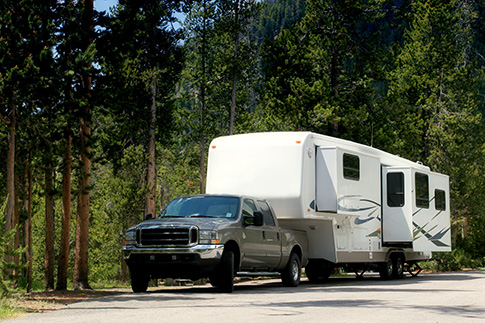Practical advice for hauling a trailer

Driving when pulling a trailer demands superior adaptability to circumstances and good reflexes, so it’s important to take the necessary precautions. If you’re planning to drive an RV or haul a trailer this summer, here is some practical advice to ensure you’re up to the challenge and enjoy a worry-free trip.
Every holder of a Class 5 driver’s licence is authorized to take the wheel of an RV or a vehicle towing a trailer. If they do, however, they must make adjustments to their driving habits. Getting a recreational trailer safely to its destination requires trucker’s reflexes and keen observational skills. If you feel at all intimidated by the idea, you may be interested to know that our driving schools offer a specialized course on driving a vehicle with a trailer. This three-hour theory and practical session should give you enough confidence to hit the road with peace of mind.
Play it safe
Play it safe When hauling a trailer, you need to take a number of precautions to ensure not only your safety but that of others. The heavier weight means that stopping distances will be much longer. Keep this in mind as you approach all red lights and stop signs, and maintain a safe following distance: ideally, you should be able to count off several seconds between the time the vehicle in front of you passes a certain point and the time you do. The large size of trailers, tent trailers, campers and similar vehicles mean that they are more sensitive to the wind. Driving at a reasonable speed is the best way to keep a firm hand on the wheel and guard against sudden gusts. Manoeuvres such as lane changes, passing other vehicles and turns must all be executed gently, to avoid the risk of losing control. Slow down as you approach curves, and avoid sudden decelerations, which could cause a loss of tension on the hitch post and in turn cause the trailer to sway. Staying calm and driving carefully will make for a much more pleasant journey.
Keep your eyes open
The larger dimensions of the vehicle you’ll be using to haul a recreational trailer obviously have an effect on blind spots: they become larger. If another driver passes you on the highway, they’ll be out of your sight line for longer, so it’s important to stay alert at all times. Pay close attention to road signs and remember the height and width of your trailer when approaching an underpass or toll booth. Signs indicating maximum height aren’t just for transport truck drivers: if you’re driving an RV, for example, they’re aimed at you, too. Remember that tree branches and power lines are potential obstacles to your vehicle. By adjusting your driving to the specific characteristics of a recreational combination, you’ll guard against any problems that might occur. Before your actual vacation, take a few practice runs to familiarize yourself with this type of driving. You’ll see: those warm-up hours will pay back a hundredfold when you set out on your adventure!
If you have more general questions about vacation driving, read these other Tips & Tricks instalments:
Summer driving: your questions answered
On vacation, on the road: seven tips for worry-free travel


Benefit from personalized advice
Do you have questions about gas-powered or electric vehicles, driving, or need recommendations to find an Approved Auto Repair Service?